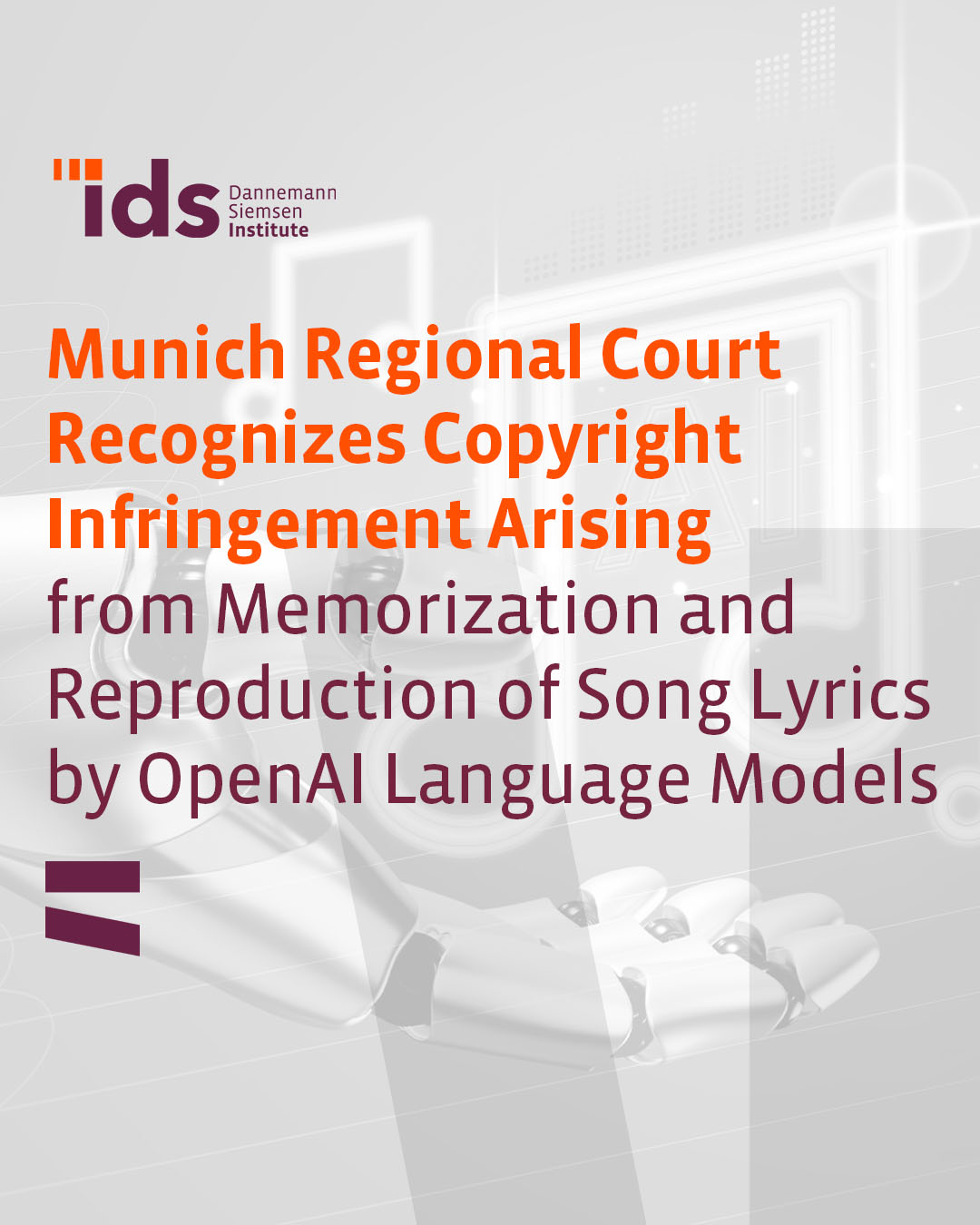18 de novembro de 2025
Share
Munich Regional Court Recognizes Copyright Infringement Arising from Memorization and Reproduction of Song Lyrics by OpenAI Language Models
The 42nd Civil Chamber of the Regional Court of Munich I, specialized in copyright law, informed the press on November 11, 2025, of the outcome of a judgment recognizing that two language models operated by companies within the OpenAI group had infringed the economic rights of nine authors represented by GEMA (the German Society for Musical Performing and Mechanical Reproduction Rights). According to the decision issued in case no. 42 O 14139/24, the models did not merely perform analytical processing of the training material; rather, they incorporated protected works into their parameters in a manner that enabled their subsequent unlawful reproduction.
The plaintiff, a German collective management organization responsible for administering copyright in musical works, argued that the models memorized song lyrics and reproduced them through the chatbot in a substantially faithful manner when prompted by users. OpenAI, in its defense, asserted that its models do not store specific texts from the training dataset but only statistical patterns, and that any reproductions result exclusively from user prompts. It further contended that both the training process and the generated output fall within applicable statutory limitations, particularly the exception for text and data mining.
The Court rejected these arguments. In the Chamber’s view, the works were reproduced in an identifiable manner within the models. The judgment describes the phenomenon of memorization—already acknowledged in the technical literature—whereby language models, in addition to extracting information, incorporate entire portions of the training material into their parameters. This incorporation was demonstrated through the comparison between the works included in the training dataset and the content reproduced in the model’s responses, ruling out any possibility of random coincidence given the length and complexity of the lyrics at issue.
The Court concluded that such memorization constitutes fixation within the meaning of Article 2 of the InfoSoc Directive and § 16 of the German Copyright Act. The judgment notes that the probabilistic form through which data become embedded in the model parameters does not alter the fact that the works can be indirectly retrieved by technical means, criterion that, according to the case law of the Court of Justice of the European Union, is sufficient to establish reproduction.
The Court also rejected the applicability of the exceptions under §§ 44b and 57 of the of the German Copyright Act, concerning text and data mining and the “irrelevant accessory” clause. According to the Court, the text and data mining exception covers only reproductions strictly necessary for analytical processing—such as technical conversions and temporary storage—and presupposes the absence of economic impact on rightsholders, which is not the case when entire works are incorporated into a model. The Chamber further refused any extensive or analogical interpretation, emphasizing that permanent memorization directly affects the authors’ economic interests. Likewise, it dismissed the “irrelevant accessory” exception, given that there was no principal work in relation to which the lyrics could be considered secondary, and because the dataset itself does not constitute a protected work.
With respect to the outputs, the judgment finds that the reproduction and public communication of excerpts of the lyrics constitute new acts of infringement. The original elements remain perceptible, and OpenAI bears full responsibility for these outputs, as it selected the training material, defined the model architecture, and controlled the parameter-adjustment process—factors demonstrating that the ultimate content results from the defendants’ technical choices rather than user actions.
The judgment also rejected the existence of any implied consent by the rightsholders and reiterated that the training of AI models does not constitute a usual or foreseeable form of exploitation of protected works. Finally, the Court concluded that no statutory limitation applies to the reproductions carried out either during training or in the generation of model responses.
The notice can be accessed via the following link: Press Release 11/2025 – Ministry of Justice of the State of Bavaria.
Note: For quick release, this English version is provided by automated translation without human review.
